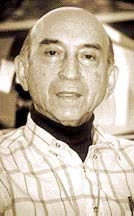|
Winter 1996 (4.4)
Lotfi Zadeh
Awarded Prestigious Japanese Prize Dr. Lotfi Zadeh was recently awarded the 1996 Okawa Prize by the Tokyo-based Okawa Foundation for Information and Telecommunications. The prize was made in recognition of his outstanding contribution to information science through the development of Fuzzy Logic and its applications. Zadeh was born in Baku, Soviet Azerbaijan in 1921 See interview in AI 2.4, Autumn 1994). He is the first non-Japanese to be awarded the Okawa prize, which includes a certificate, a gold medal and an award of 10 million yen (currently equivalent to US $90,000). Also see Commencement Speech at Berkeley (University of California) in May 1997 (AI 6.1, Spring 1998). Fuzzy Logic is based on the theory of Fuzzy Sets, which Zadeh pioneered in the mid-1960s. In a sharp break with the traditions of classical Aristotelian logic, Fuzzy Logic attempts to mirror the pervasive imprecision of the real world by providing a model for human reasoning in which everything-including truth-is a matter of degree. Japanese engineers and scientists picked up on Fuzzy Logic very early at a time when it was viewed with skepticism in the West. Its first important application in Japan was the subway system in the city of Sendai, which has functioned flawlessly since its inauguration in 1987. Today, Fuzzy Logic-based products are ubiquitous in Japan and can be found in consumer goods from washing machines, air conditioners, cameras and camcorders to industrial process control, medical instrumentation, signal processing and speech recognition. Fuzzy Logic is gradually becoming more accepted in the Western world, especially in Europe and more recently in the United States. NASA, for example, is currently experimenting with Fuzzy Logic controllers in the space shuttle, and the concept is also being increasingly employed in industrial process control. As a constituent of soft computing, Fuzzy Logic is emerging as a key methodology in the conception, design and deployment of intelligent systems. In addition to the Okawa Prize, Zadeh has also been the recipient of Japan's other prestigious industrial award, the Honda Prize (1989). His colleagues in Azerbaijan have recognized his achievements, too. In 1993, the Azerbaijan State Oil Academy awarded him an Honorary Professorship. Currently, he is Professor Emeritus
of Electrical Engineering and Computer Sciences at the University
of California at Berkeley, and also serves as Director of BISC
(Berkeley Initiative in Soft Computing). Though officially retired,
he is extremely active. Since 1983, for example, he has accumulated
2 million "Frequent Flyer" miles from traveling to
conferences and speaking engagements throughout the world. Between
conferences, he is busy writing and soon expects to publish a
new theory on Fuzzy Information Granulation, which he believes
will result in many books and articles about Fuzzy Logic (which
number in the thousands) having to be rewritten. From Azerbaijan International (4.4) Winter 1996. AI Home | Magazine Choice | Topics | Store | Contact us |


